新版 广州 八年级上Unit6 知识点总结
八年级上册英语unit6知识点归纳

八年级上册英语unit6知识点归纳Unit 6的内容是关于Environmental protection的,学习这个单元的主要目的是学会如何保护环境,同时了解环境保护的重要性。
本文将从以下几个方面进行归纳:一、单词和短语1. garbage - 垃圾2. pollution - 污染3. environment - 环境4. recycle - 回收5. reduce - 减少6. reuse - 再利用7. save - 节省8. plastic - 塑料9. wildlife - 野生动物10. energy - 能源二、语法知识1. 现在进行时在描述目前正在进行的事情时,我们需要使用现在进行时。
例如:Pollution is a serious problem,so we are working hard to reduce it - 污染是一个严重的问题,所以我们正在努力减少它。
2. 情态动词几个常用的情态动词有can、must和should,它们被用来表示可能性、必须性和应该性。
例如:We should reduce plastic usage - 我们应该减少塑料用量。
三、对话1. 对话1A: Can you help me with this trash?B: Sure, I'll put it in the recycling bin.A: Great, thanks for helping to recycle.2. 对话2A: Have you heard about the pollution in the river?B: No, what happened?A: There was an oil spill and it's affecting the wildlife.B: We need to do something to prevent things like this from happening.四、阅读理解阅读理解在Unit 6中非常重要,因为它们可以帮助我们更好地理解环境保护的概念。
新版八年级英语上册第六单元知识点归纳

Unit6 I’m going to study computer science.一、短语归纳grow up成长;长大every day每天be sure about对……有把握make sure确信;务必be able to能the meaning of……的意思different kinds of不同种类的write down写下;记下take up开始做;学着做have to do with关于;与……有关系hardly ever几乎不;很少grow up(长大;成熟;成长)take acting lessons 上表computer programmer(计算机程序设计员;编程人员)演课be sure about(确信;对……有把握)make sure(确保;查明)get good grades 取得好成绩eat healthier food 吃有益健康的食物get lots of exercise 多锻炼make the soccer组建球队二、知识点归纳1. 将来时态构成:be going to+动词原形= will +动词原形打算做某事2. too…to…太……而不能……/太……以至于不能= so……that…..not3. send…to…把……送到…… send sb. sth send sth to sb. 送给某人某东西4. practice doing练习做某事5. keep on doing sth.不断地做某事/坚持做某事keep doing sth 一直做某事6. learn to do sth.学会做某事learn from sb 像某人学习7. finish doing sth.做完某事8. promise to do sth.许诺去做某事promise sb. sth 允诺某人某事9. help sb. (to) do sth.帮助某人做某事help sb. with sth.10. remember to do sth.记住做某事remember doing sth.记得做过某事11. agree to do sth.同意做某事agree with sb 与某人的意见一致三、句型1. What do you want to be when you grow up 当你长大了,你想做什么I want to be an engineer. 我想成为一名工程师。
八年级unit6知识点总结

八年级unit6知识点总结在八年级的学习中,Unit6涉及到了很多重要的知识点。
这些知识点不仅是我们学习英语的基础,而且对我们今后的学习和生活都有很大的影响。
下面是本文对八年级Unit6知识点的总结和归纳。
一、动词的时态在Unit6中,我们学习了英语中最常用的三种时态:一般现在时、一般过去时和一般将来时。
这三种时态是英语语法中最基本的部分,掌握好这三种时态对于我们后续英语的学习十分重要。
在学习一般现在时,我们知道一般现在时表示现在正在发生或经常发生的动作或状态,如I play basketball every day. 在学习一般过去时,我们知道一般过去时表示过去某个时刻或某一时期内所发生的动作或状态,如Yesterday, I played basketball. 在学习一般将来时,我们知道一般将来时表示将来的动作或状态,如Tomorrow, I will play basketball.二、疑问句的构成及回答在Unit6中,我们还学习了疑问句的构成及回答。
这也是英语语法中很重要的一部分。
在英语中,疑问句一般是由助动词或疑问词加上主语和谓语所组成的。
例如,Do you often eat pizza?这是一个由助动词do和主语you以及动词eat所构成的疑问句。
其回答是Yes, I do. / No, I don't.三、形容词的比较级和最高级在Unit6中,我们还学习了形容词的比较级和最高级。
形容词的比较级表示“比……更……”,最高级表示“最……”。
例如,Tiger is heavier than Lion.这是一个形容词比较级的运用,表示“老虎比狮子更重”。
再例如,Tom is the tallest student in his class.这是一个形容词最高级的运用,表示“汤姆是班里最高的学生”。
四、短语动词在Unit6中,我们学习了很多短语动词。
短语动词是由一个动词和一个或多个小品词组成的词组。
八年级上unit6广州汇总整理

^.
教学目标Unit6重难点知识梳理
重点、难点现在完成时的用法,for 和Since的用法
考点及考试要求
教学内容
Unit 6 Ancient stories
【知识要点】
★Key words:
1. ancient adj. 古代的in ancient times 在古代
ancient buildings 古代的建筑物
【拓展】近义词:old adj. 老的,旧的;反义词:modern adj. 现代的
2. war n. 战争,可数名词
the First World War 第一次世界大战the Second World War 第二次世界大战
The two countries have been at war for five years . 这两个国家打了五年的战。
【拓展】反义词:peace n. 和平
People are against the war and for the peace. 人们反对战争,支持和平。
3. understand v. 懂,理解注意:understand的过去式和过去分词都是understood.
I don’t what the teacher said. 我不理解老师说的话。
4. difference n.差别;不同<可数>
different adj. 不同的;有差别的differ v. 区分
Can you find out the differences between the two pictures?。
八年级上 unit 6 知识点总结

Unite 6 I’m going to study computer science.一、必记短语:Grow up agree withStudy computer science be sure aboutMake sure send sth to sb.Get good grades get lots of exerciseMake some resolutions be able toMake promises too…toImprove our lives take upWrite down at the beginning ofPhysical health have to do withFor this reason be going toHardly ever the meaning ofIn common a weekly planPromise to do sth promise sb sthPromise+that keep on doing sthAgree to do sth learn to do sthPractice doing sth every dayBe able to do sth be sure aboutMake sure that/of tidy uptake acting lessons=have acting lessonshelp oneself to二、短语辨析,同义短语转换以及细节语法:1.)cook n.厨师cook v.烹调,煮,烧Cooker n.厨师2.)常跟动词-ing做宾语的动词短语有:Consider doing sth avoid doing sthKeep on doing sth practice doing sthFinish doing sth enjoy doing sthMind doing sth risk doing sthCan’t help doing sth imagining doing sthLook forward to doing sth3.)5.)6.)7.)名词和代词在词组中的位置:动词+副词的搭配Eg:write down 当词语是名词时放在当词语是代词时动词+介词的搭配Eg: look for 放在三、本单元大语法:be going to 的用法以及和will的区别(一)be going to表示即将发生的动作;will表示将来发生的事情,不一定是最近期间之事。
八年级上册英语U6知识点总结

八年级上册英语U6知识点总结八年级上册英语Unit 6的内容主要涵盖了以下几个方面的知识点:1. 过去进行时过去进行时表示在过去某个时间正在进行的动作或情况。
其构成为“was/were + 动词-ing”。
例如:I was watching TV when she came.She was playing chess with her grandfather yesterday.2. 现在完成进行时现在完成进行时表示从过去某个时间开始一直持续到现在还在进行的动作或情况。
其构成为“have/has + been + 动词-ing”。
例如:I have been studying English for 2 hours.She has been learning how to cook since last year.3. 倍数和分数的表达英语中常用的表示倍数和分数的词汇有:倍数:twice、three times、four times 等。
分数:half、a third、a quarter 等。
例如:She is twice as tall as me.I have eaten half of the pizza.4. 以-ed和-ing结尾的形容词的用法以-ed结尾的形容词常用来形容人的感受或状态。
以-ing结尾的形容词常用来形容物体或场景的特征。
例如:I am interested in English.The view from the top of the hill is amazing.5. 偏爱和讨厌的表达常用的表示偏爱的词汇有like、love等;常用的表示讨厌的词汇有dislike、hate等。
例如:I like playing basketball.She hates eating vegetables.总之,八年级上册英语Unit 6的知识点涵盖了许多语法和词汇方面的内容,需要同学们多加练习和巩固掌握,才能在英语学习中更加得心应手。
新八年级上册英语第六单元知识总结(五篇范例)
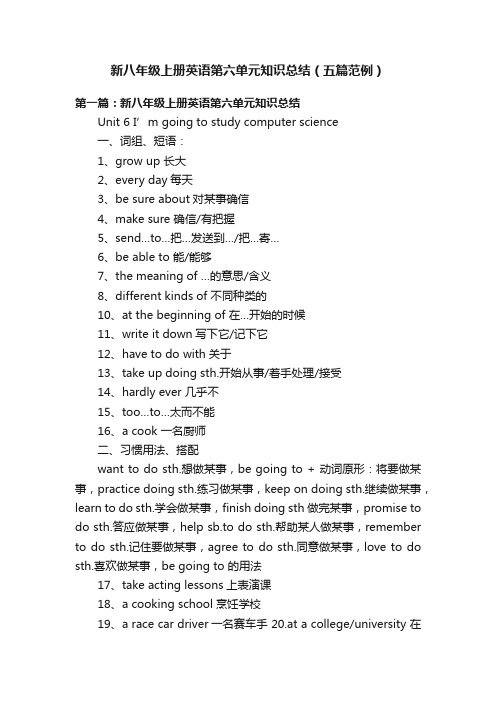
新八年级上册英语第六单元知识总结(五篇范例)第一篇:新八年级上册英语第六单元知识总结Unit 6 I’m going to study computer science一、词组、短语:1、grow up 长大2、every day每天3、be sure about对某事确信4、make sure 确信/有把握5、send…to…把…发送到…/把…寄…6、be able to 能/能够7、the meaning of …的意思/含义8、different kinds of 不同种类的10、at the beginning of 在…开始的时候11、write it down写下它/记下它12、have to do with关于13、take up doing sth.开始从事/着手处理/接受14、hardly ever 几乎不15、too…to…太而不能16、a cook 一名厨师二、习惯用法、搭配want to do sth.想做某事,be going to + 动词原形:将要做某事,practice doing sth.练习做某事,keep on doing sth.继续做某事,learn to do sth.学会做某事,finish doing sth做完某事,promise to do sth.答应做某事,help sb.to do sth.帮助某人做某事,remember to do sth.记住要做某事,agree to do sth.同意做某事,love to do sth.喜欢做某事,be going to 的用法17、take acting lessons上表演课18、a cooking school烹饪学校19、a race car driver一名赛车手 20.at a college/university 在大学里 21.at college /university在上大学 22.eat healthier food吃更健康的食物 23.get lots of exercise多锻炼24.make a weekly plan制定每周计划25.have…in common有共同之处 26.be an engineer当一名工程师 27.take medicine吃药28.make resolutions下决心29.make the soccer team组建足球队30.learn another foreign language学会另门语言31.agree with 同意be going to + 动词原形——表示将来的打算、计划或安排。
八年级上册unit6英语知识点

八年级上册unit6英语知识点八年级上册unit6英语知识点主要涉及时态、英语口语和阅读技巧。
本文将从这三个方面分别展开讲解。
一、时态1. 一般现在时一般现在时表示现在经常或习惯性的动作、状态或真理。
例如:I wake up at seven every morning.She watches TV every night.The earth moves around the sun.2. 现在进行时现在进行时表示现在正在进行的动作。
例如:I am watching TV now.She is studying at the library.They are playing soccer in the park.3. 一般过去时一般过去时表示过去发生的动作或状态。
例如:I watched TV last night.She studied at the library yesterday.They played soccer in the park last weekend.4. 过去进行时过去进行时表示过去正在进行的动作。
例如:I was watching TV at this time yesterday.She was studying at the library last night.They were playing soccer in the park when it started to rain.5. 现在完成时现在完成时表示过去某个时间开始到现在为止的动作或状态。
例如:I have watched five movies this month.She has studied English for three years.They have played soccer every week for a year.二、英语口语英语口语是英语学习中非常重要的一部分。
以下是几个英语口语技巧:1. 听懂对话英语口语基础是听懂对话。
英语八年级上册Unit 6重点知识及短语归纳

Unit 6 重点知识1. keep (on) doing sth 坚持做某事keep + (sb/sth) + adj.使(某人/物)处于某种状态keep… away from…使…不靠近2. be going to + 动词原形(计划、打算或事先决定了的事情)will+动词原形3. be sure of/about 确信;对…有把握make sure 确保,查明be sure + (that)从句be sure to do 一定做…4. move to + 地点5. take …lessons 上…课take acting lessons 上表演课6. send …to…把…寄/送给…send sth to sb= send sb sth7. make a promise to sb 向某人承诺promise to do sth 承诺做某事keep/break a promise 信守/违背诺言8. get back from+地点名词从…回来get back to 回到…9. at the beginning of …在…的开始at the start of …在…的开始at the end of …在…的结束,末端10. too…to…太…而不能…so…that…如此…以至于…eg. My son is too young to join the army.= My son isn’t old enough to join the army. = My son is so young that he can’t join the army.我儿子太小,不能去参军。
11. agree with sb 同意;赞成(某人)agree to do sth 同意做某事12. have to do with 关于,与…有关系have nothing to do with 与…无关13. do some cooking=cook sthcook sb sth= cook sth for sb 为某人煮…14. make a resolution to do …下决心做…= decide to do…15. practice 做动词,“实习,练习,训练”practice sth 练习…practice doing sth 练习做…practice 做名词,意为“实践,练习”,为不可数名词16. learn to do sth 学着做某事learn from 向某人学习,从某处获得知识learn of 听说,了解到learn about 了解17. There be 句型There is + 主语+ 地点状语There be + not/no18. finish sth 完成某事finish doing sth 完成做某事19. group up 长得;成熟;成长20. be able to do sth 能够做某事21. get good grades 取得好成绩22. have…in common 在…方面有共同点23. take up (1)学着做;开始做(2)占据(空间),占用(时间)(3)接受。
八年级上册unit6重点归纳
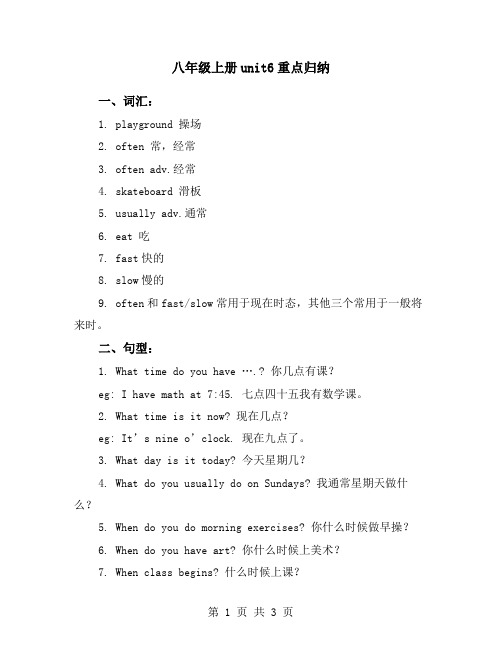
八年级上册unit6重点归纳一、词汇:1. playground 操场2. often 常,经常3. often adv.经常4. skateboard 滑板5. usually adv.通常6. eat 吃7. fast快的8. slow慢的9. often和fast/slow常用于现在时态,其他三个常用于一般将来时。
二、句型:1. What time do you have ….? 你几点有课?eg: I have math at 7:45. 七点四十五我有数学课。
2. What time is it now? 现在几点?eg: It’s nine o’clock. 现在九点了。
3. What day is it today? 今天星期几?4. What do you usually do on Sundays? 我通常星期天做什么?5. When do you do morning exercises? 你什么时候做早操?6. When do you have art? 你什么时候上美术?7. When class begins? 什么时候上课?8. What’s the weather like today? 今天天气怎么样?9. It’s time to do sth是是做某事的时间了。
It’s timefor sth是去做某事的时间了。
两者后面跟的都是名词。
eg: It’s time to go to school. It’s time for school. 到了上学的点啦。
三、短语:play soccer 踢足球 play basketball打篮球 play football踢足球 have a dance party开个舞会打扫卫生 clean the classroom打扫教室 clean the blackboard擦黑板 clean the windows擦窗户 get up起床 usually通常 sometime某个时候everywhere到处 sometime有时候 never从不 sometime某个时候,偶尔 always总是 wear her green hat戴着她的绿色帽子 listen to 听;听从 often经常 get up late起床晚、睡懒觉 in the morning 在早晨 come from来自 be good for身体好、有好处 look at看一下watch看、注视、观察、电视、电影、比赛 go to bed上床睡觉 go to school去上学 go to the cinema去看电影 play sports做运动、锻炼、健身、运动活动 read a book看书 go shopping去购物 go swimming去游泳 go hiking去郊游 go for a walk去散步 go out for dinner出去吃饭 go out for lunch出去吃午饭……play basketball打篮球 play soccer踢足球 watch TV看电视 eat an egg 吃一个鸡蛋 eat an apple吃一个苹果 play games玩游戏短语中的介词短语要放在所修饰的词的前面。
必备的八年级上册英语unit 6知识点归纳

必备的八年级上册英语unit 6知识点归纳
一、语法用“be going to”结构和“ want to be”谈论生活目标。
一)be going to”结构用法:谈论理想、打算或计划可以用“be going to”结构,也可以用want to do 和plan to do 的一般现在时。
“be going to”结构可以用来谈论理想、计划、打算,或者根据目前的善,推测很可能将要发生的事。
含有be going to 结构的句子中往往有表示将来的时间状语。
如:
①I’m going to wash clothes tomorrow.
②I want to wash clothes tomorrow.
③I plan to wash clothes tomorrow.
④Look at the black clouds. It#39;s going to rain.看那些乌云,快要下雨了。
(推测)
⑤Oh, dear! It’s 8:30. Class begins at 8:00. We’re going to be late.
注意:
1、当be going to后面遇到形容词时,要在形容词前加be,构成动词短语,因为be going to后面要跟动词原形。
①I’m going to be free tomorrow. 明天我有空。
通过对必备的八年级上册英语unit 6知识点归纳的学习,是否已经掌握了本文知识点,更多参考资料尽在!。
八年级英语上unit6知识点梳理

八年级英语上unit6知识点梳理本文是八年级英语上unit6知识点的梳理,旨在帮助学生检查自己在学习本单元知识点中的理解情况,更好地掌握和应用相关的知识。
一、动词-ing形式和动词不定式的用法在英语中,动词-ing形式和动词不定式都具有动词的基本意义,但在用法上却有所不同:动词-ing形式可以用作主语、宾语、表语等。
例如:- Swimming is good for health. 游泳对健康有益。
- I enjoy singing. 我喜欢唱歌。
- Her hobby is painting. 她的爱好是绘画。
而动词不定式则可以用作主语、宾语、表语、宾补、定语、状语等。
例如:- To live a happy life is everyone's dream. 过上快乐的生活是每个人的梦想。
- I want to visit the Great Wall. 我想参观长城。
- The most important thing is to be kind. 最重要的是要善良。
二、被动语态的构成和用法被动语态是英语中常用的一种语态,表示动作的承受者或对象,通常以动词的过去分词形式为基础,加上与主语相应的be动词或情态动词构成。
例如:- The letter was written by John. 这封信是约翰写的。
- The book has been read by many people. 这本书被很多人阅读过。
被动语态的用法有以下几点:1.强调动作的承受者或对象。
2.避免重复使用主语或让主语不重要。
3.在不知道动作执行者的情况下使用。
三、虚拟语气的用法英语中的虚拟语气是用于表达与事实相反或未发生的假设情况的语气。
虚拟语气常见的形式包括:虚拟条件句、愿望句和建议句等。
例如:1.虚拟条件句:表示与事实相反或可能性很小的假设情况。
其中,与现在事实相反的用过去时,与过去事实相反的用过去完成时,与将来事实相反的用would/could/might+动词原形。
八年级上册英语unit6知识点

八年级上册英语unit6知识点Unit 6的主要内容是描述了人们从出生到长大,在不同的年龄阶段所经历的变化。
为了更好地理解这个话题,我们需要了解一些相关的单词和语法知识点。
1. 单词纵览在Unit 6中,有很多新单词需要掌握,以下是一些重要的单词。
1.1. AgeAge指“年龄”,常用于表示人的年龄。
例如:I am 14 years old.(我今年14岁了。
)1.2. BirthdayBirthday指“生日”。
例如:My birthday is on February 14th.(我的生日是2月14日。
)1.3. Grow upGrow up表示“长大”,通常用于描述一个人从儿童到成人的阶段,例如:My dream is to grow up and become a doctor.(我的梦想是长大后成为一名医生。
)1.4. AdulthoodAdulthood指“成年”,即一个人已经长大成人。
例如:When you reach adulthood, you have more responsibility.(当你成年后,你拥有更多的责任。
)1.5. RetirementRetirement指“退休”,通常用于描述一个人已经到了可以退休的年龄。
例如:My father is going to retire next year.(我父亲明年就要退休了。
)2. 语法重点除了词汇知识外,本单元还需要掌握一些语法重点。
2.1. 形容词的比较级和最高级形容词的比较级和最高级分别用于比较两个或多个事物之间的差异、优劣等。
例如:- My sister is taller than me.(我妹妹比我高。
)- Jerry is the smartest boy in our class.(Jerry是我们班最聪明的男孩。
)在比较级和最高级的使用中,需要注意一些变化,可以参考以下表格。
原级 (Positive) 比较级 (Comparative) 最高级 (Superlative)big bigger biggesthappy happier happiestgood better bestbad worse worstfar farther/further farthest/furthestlittle less leastmuch/many more most2.2. 情态动词情态动词用于表示说话人对某种情况的看法,例如:- You should study harder.(你应该更努力学习。
八年级上英语unit6知识点
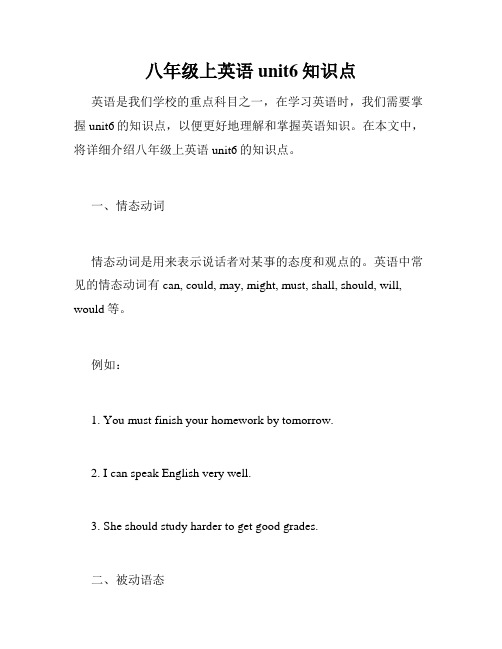
八年级上英语unit6知识点英语是我们学校的重点科目之一,在学习英语时,我们需要掌握unit6的知识点,以便更好地理解和掌握英语知识。
在本文中,将详细介绍八年级上英语unit6的知识点。
一、情态动词情态动词是用来表示说话者对某事的态度和观点的。
英语中常见的情态动词有can, could, may, might, must, shall, should, will, would等。
例如:1. You must finish your homework by tomorrow.2. I can speak English very well.3. She should study harder to get good grades.二、被动语态被动语态是指动作的对象成为句子的主语,动作的执行者成为句子的宾语。
在被动语态中,谓语动词通常由be动词加上过去分词构成。
被动语态用来强调动作的承受者。
例如:1. The cake was made by my mom.2. The car was repaired by the mechanic.三、虚拟语气虚拟语气是指语气的一种特殊形式,用来表示不真实、假设或愿望等情况。
在英语中,虚拟语气有三种主要形式:虚拟条件句、虚拟结果句和虚拟语气的陈述句。
例如:1. If I were rich, I would travel around the world.2. If he had studied harder, he would have passed the exam.四、宾语从句宾语从句是指在一个句子中充当主句的宾语的一个从句。
常见的引导词有that, whether, if等。
例如:1. She said that she would visit me tomorrow.2. I don’t know whether it will rain tomorrow.五、形容词比较级和最高级形容词比较级和最高级用于描述两个或两个以上的事物在某种方面的差异。
八年级上unit6知识点
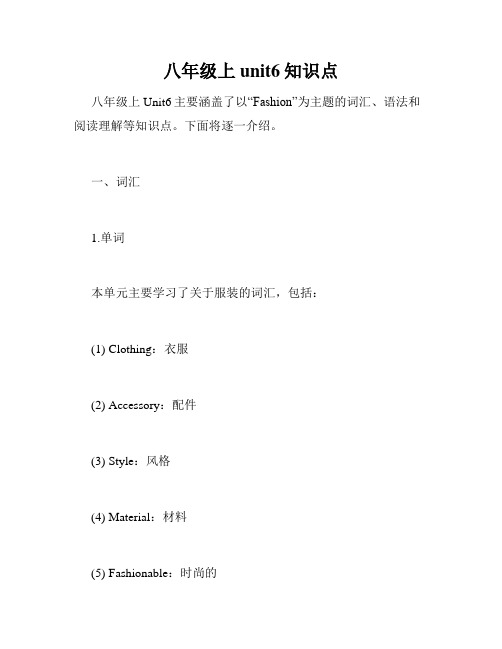
八年级上unit6知识点八年级上Unit6主要涵盖了以“Fashion”为主题的词汇、语法和阅读理解等知识点。
下面将逐一介绍。
一、词汇1.单词本单元主要学习了关于服装的词汇,包括:(1) Clothing:衣服(2) Accessory:配件(3) Style:风格(4) Material:材料(5) Fashionable:时尚的(6) Trendy:流行的(7) Formal:正式的(8) Casual:随便的(9) Designer:设计师(10) Brand:品牌(11) Label:标签(12) Measure:尺寸(13) Fit:合身的(14) Comfortable:舒适的2.短语此外,本单元中也学习了一些与服装相关的常用短语:(1) Try on:试穿(2) Dress up:打扮(3) Match with:与……搭配(4) Go well with:与……相配(5) Dress code:着装要求(6) Dress casually/formally:随便地/正式地穿着(7) Stay in style:保持时尚(8) Be out of fashion:过时的(9) Keep up with the latest trends:跟上最新潮流(10) Fashion sense:时尚感(11) Fashion icon:时尚偶像二、语法1. 物主代词的用法物主代词包括my、your、his、her、its、our、their等。
当修饰不定代词或名词时,需注意以下用法:(1) “我的”用my;(2) “你的”用your;(3) “他/她/它的”用his/her/its;(4) “我们的”用our;(5) “他们/她们/它们的”用their。
例如:This is my backpack, not yours.(这是我的背包,不是你的。
)2. 不定代词的用法不定代词主要包括:somebody/anybody/nobody、something/anything/nothing、somewhere/anywhere/nowhere等。
广州市初中英语八年级上册 Unit 6知识点总结(专题培优)

一、选择题1.——What does she ________ soap operas?——She doesn't like them.A.think over B.look atC.think of D.look like C解析:C【解析】【详解】句意:——她认为肥皂剧怎么样?——她不喜欢它们。
考查动词短语。
think over仔细考虑,look at看,think of想,认为;look like看起来像。
根据回答“She doesn't like them.”可知此处询问她的看法,故用句型What does/do sb. think of sth?:某人认为某物怎么样?故选C。
2.—Where will you live in ten years,Helen?—I'll ________ stay in Beijing,but I'm not sure about it.A.seriously B.beautifully C.carefully D.probably D解析:D【解析】【详解】句意:——十年后你会住在哪里,海伦?——我可能会留在北京,但我不确定。
A. seriously 认真地;B. beautifully漂亮地;C. carefully小心地;D. probably可能地。
由句子but I'm not sure about it. 但我不确定。
可知用probably表示推测。
故选D。
3.She was ________ an e-mail from her friend the whole morning, but it didn’t come. A.explaining B.expressing C.experiencing D.expecting D解析:D【详解】句意:她整个上午都在等她朋友的电子邮件,但没有来。
考查动词辨析。
八年级上u6知识点
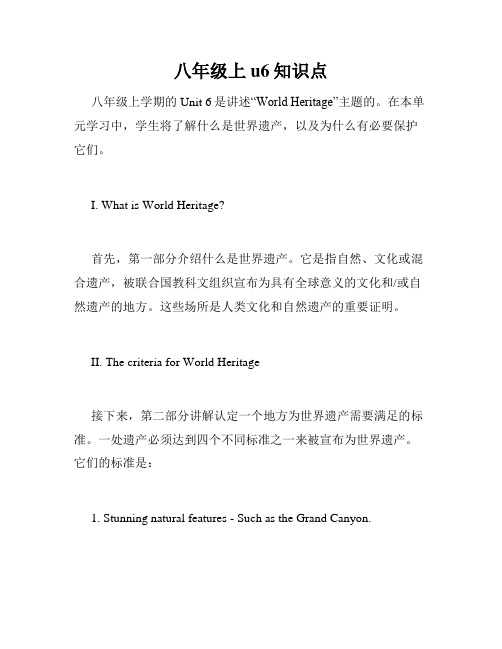
八年级上u6知识点八年级上学期的Unit 6是讲述“World Heritage”主题的。
在本单元学习中,学生将了解什么是世界遗产,以及为什么有必要保护它们。
I. What is World Heritage?首先,第一部分介绍什么是世界遗产。
它是指自然、文化或混合遗产,被联合国教科文组织宣布为具有全球意义的文化和/或自然遗产的地方。
这些场所是人类文化和自然遗产的重要证明。
II. The criteria for World Heritage接下来,第二部分讲解认定一个地方为世界遗产需要满足的标准。
一处遗产必须达到四个不同标准之一来被宣布为世界遗产。
它们的标准是:1. Stunning natural features - Such as the Grand Canyon.2. Masterpieces of human creativity – Such as the Colosseum in Rome.3. Important cultural tradition - Such as the Acropolis in Athens.4. Valuable records of history - Such as the Ancient City of Damascus.III. The significance of World Heritage第三部分重点介绍了为什么有必要保护世界遗产。
这些地方对世界其他地方和人们的知识和理解有极大的意义。
除此之外,世界遗产还有助于保护全球文化和自然遗产,为未来的世代保持这些遗产在全球层面上免受破坏和损失。
IV. Famous examples of World Heritage sites最后,在第四部分,我们介绍了一些著名的世界遗产。
其中一些包括:1. Great Barrier Reef, Australia.2. Angkor Wat, Cambodia.3. Petra, Jordan.4. Taj Mahal, India.5. Grand Canyon National Park, USA.总之,Unit 6是一个集中在世界遗产的知识点的单元。
- 1、下载文档前请自行甄别文档内容的完整性,平台不提供额外的编辑、内容补充、找答案等附加服务。
- 2、"仅部分预览"的文档,不可在线预览部分如存在完整性等问题,可反馈申请退款(可完整预览的文档不适用该条件!)。
- 3、如文档侵犯您的权益,请联系客服反馈,我们会尽快为您处理(人工客服工作时间:9:00-18:30)。
八年级上Unit6课堂讲义一、重要短语seconds later一会儿后look down朝下看capture a city占领一个城市leave a huge wooden horse留下一个大木马outside the main gate大门外pull /drag sth. into把某物拖进/拉进/拽进on wheels装有轮子play/make jokes about/ on.. 开关于…的玩笑go to sleep/fall asleep睡着了by midnight到了半夜except for …除了…wait for another hour再等一个钟drag sb. away把某人拖走the Greek army希腊军队succeed in doing sth. 成功做某事二、语言点精讲1. The Greeks have tried for ten years to capture our city.Greek n. 希腊人 希腊语adj. 希腊的 希腊人的Greece 希腊try to do sth. = try one’s best to do sth. 尽力做某事2. Well, it was too big for them to take away. Too…to… 太…以至于不能…基本结构 too + adj./adv. + to +v.原形eg: He is too shy to speak to her. It’s too cheap to be good. (便宜无好货)too…(for sb/sth) to do 太…而不能= so…that…3. It’s on wheels. on wheels 意为“下面装有轮子”4. They sang and danced around the horse and made jokes about the stupid Greeks.make jokes about (sb.) 开某人玩笑laugh at 意思相近5. Then they locked all the gates of the city and all went to sleep.sleep v. 睡觉fall asleep入睡=go to sleep = go to bed6.including 包括 (prep) include 包括 include 为动词 作为谓语使用eg Does the list include my name? 这个表包括了我的名字吗My family includes my father, my mother, my brother and me.including 为介词The price is $200 each, not including tax.There are four people in my family, including me.【练一练】用include ,including填空。
• 1) We only spent $40 for dinner, _________ the tip.• 2) All of them _________ Peter went to the beach for a picnic.• 3) The book ________ all aspects of animals.• 4) There are 49 students in the classroom, _______ the teacher.7. By midnight, the square was empty. 到了半夜, 广场空荡荡的.此句中by为介词,意为“到…时 不晚于… 到某时之前”eg. She had to finish all the homework by 10 o’clock. 她必须在10点前做完所有的作业。
8.except 和except for 的区别except 表示“除去,不包括”强调所排除的“不包括在内”。
指在同类的整体中除去一个部分。
except ,besides,except for,but 之间的区别这四个介词或者短语都可以表示“除了…”的意思。
但except仅表示“除了…”,排除在外,后面可以接that,what,when等引导的从句;而besides表示“除了…还有…”的意思,表示包含在内;except for 表示“除了…”,它引出一个与前面的词相反的原因或者事例;but的意思与except接近,它主要与某些不定代词如nothing,all,anything,no one,anyone等连用。
"Except for one old lady, the bus was empty."She can do everything except cook.I know nothing about it except what I have read in the papers.Most of the Chinese people usually go to work on the bike except when it rains.Besides milk and cheese, we need vegetables.Besides football, I like playing basketball and table tennis.No one but me passed the exam yesterday.Nobody but Li Ming talked to Lao Wang today.【练一练】:1. No one knew Mr Beson's address _______ his daughter.A. exceptB. exceptsC. onlyD. besides2. Do you know any other foreign language ______ English?A. exceptB. butC. besideD. besides3. I know nothing about the young lady ________ she is from Beijing.A. exceptB. except forC. except thatD. besides析:Key:1. A 2. D 3. C9. Outside stood the Greek army. 倒装句 强调地点outside ) 正常语序是 The Greek army stood outside. 由于句子体裁和动词原因使用的倒装:像come,lie,stand,walk这类不及物动词且地点状语较短时,为使句子更紧凑,通常使用倒装。
There stands a boy. Here comes the bus10. The army entered the city, seized the captain and dragged him away.enter 表示“进入”一个具体处所或加入某个组织而成为其中一员时后面无需加介词。
11. In one night, they succeeded in capturing it with a trick.■ in one night 一夜之间succeed v. 成功success n. 成功successful adj. 成功的successfully adv. 成功地succeed +in +动名词“成功地完成某事” succeed in doing sth. 成功做了某事= manage to do sth. / be able to do sth.12.order vt. 命令, 要求The policeman ordered the motorist to stop. 警察指示让那开车的人停车n. 命令, 指示He gave orders that the job be done in three days. 他指示三天内完成这项工作。
13.celebrate v. 庆祝, 庆贺We held a party to celebrate our success. 我们举行宴会庆祝我们的成功。
celebration n. 庆祝, 庆贺congratulations n. 祝贺,恭喜。
14. pretend v. 假装He pretended that he was innocent. 他假装无辜。
He pretended to be friendly with me. 他假装对我友善Chapter 6 综合测试卷一,选择。
1,In this room, there are 50 people,_ _ 15 gate guards.A. includeB. includesC. includingD. includeing2. This is a good book, _ _ some spelling mistakes.A. exceptB. besidesC. except forD. except of3. Lucy used to _ an article every morning.A. readB. readingC. readsD. readed4. Tim is _ tired _ run upstairs.A. too, not toB. too, toC. so, thatD. enough, to5. The captain ordered the soldier _ _a secret.A. keepB. to keepC. keepingD. keeps6. Shelly is _in English.A. interestB. interestedC. interestingD. interests7. I spent half an hour _ my homework.A. finishB. finishedC. finishingD. to finish8. Don’t _ at me.A. stareB. staringC. staredD. stares9. Beware _ that book.A. ofB. inC. atD. with10. San _ English for three years.A. learnB. learnedC. is learningD. have learned11. _have they fell asleep? They have fell asleep for 15 minutes.A. How soonB. How oftenC. How muchD. How long12. _is a good way of learn English.A. practiceB. practicingC. practicedD. practices13. I _Alice since we came to Shenzhen.A. knowB. knewC. have knewD. knows14. Have you finished your reading _?A. alreadyB. everC. yetD. never15. How long _ your mother _ the English club? Five years.A. did, join C. have, joined C. have been D. have, been in16. Where is Tony ? He _ Japan. He _ Three times before,A. has been to, has gone toB. has gone to , has been toC. had been to , has goneD. has gone to, has been17. We’ll have a picnic tomorrow if it _rain.A. won’tB. isn’tC. doesn’tD. wasn’t18. How long has Peter been reading that novel? ____A. An hour agoB. Before an hour agoC. Since an hour agoD. For an hour ago19 They left here ____A. five minutes agoB. before five minutesC. since five minutes agoD. for five minutes20 Where’s your English book? Oh, I _it at home.A. leaveB. have leftC. forgetD. forgot二,完形填空。
